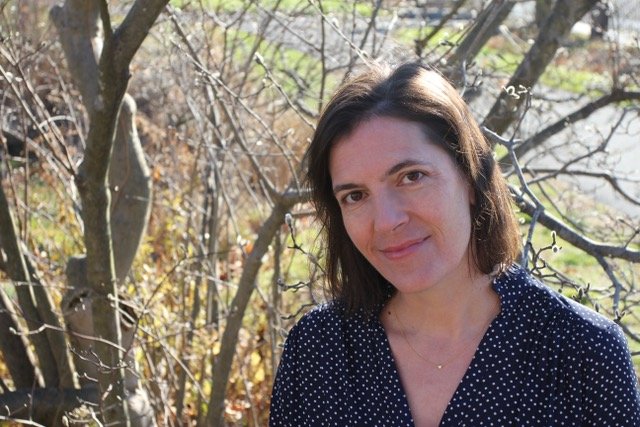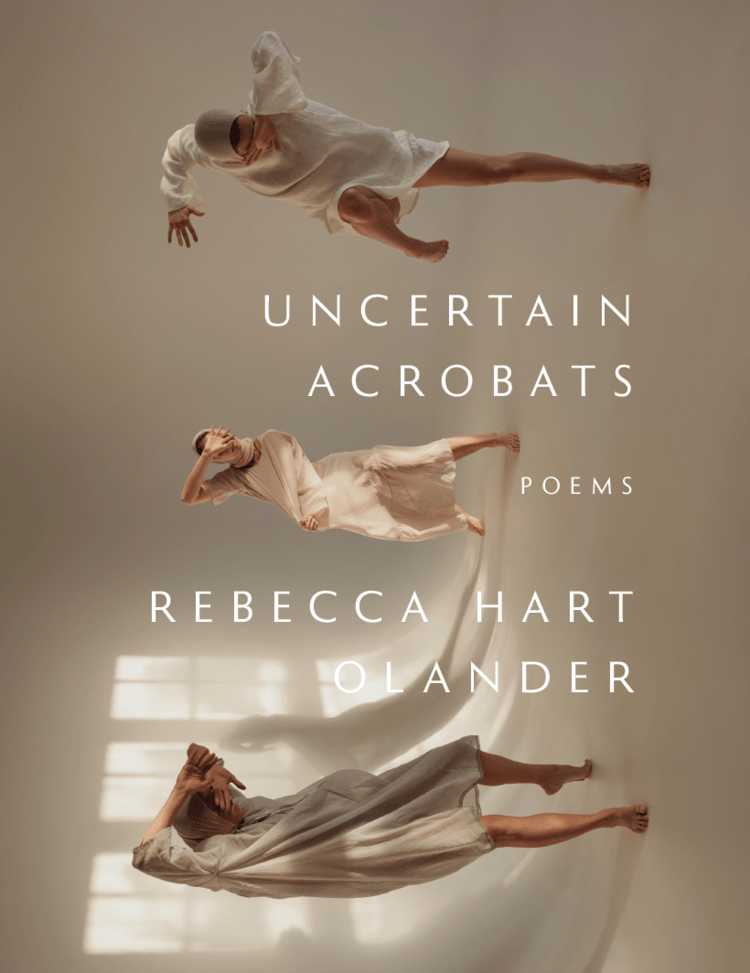When did you first encounter poetry? How did you discover that you wanted to write poems?
My stepmother is the Massachusetts poet Christopher Jane Corkery, so being a poet was something I knew was a real thing from childhood, when she came into my life. I wrote my first poem that I remember at seven, based on a prompt from her (there’s a short poem in Uncertain Acrobats about that)! I began to write and read poetry a little more seriously in high school, and my undergrad thesis at Hampshire College was a poetry collection. I didn’t get my MFA until later in life (in 2015, from VCFA), after my children were mostly grown. But writing poetry has been the way I encounter and try to understand the mysteries, complications, sorrows, and joys of being human for my whole life.
Do you have a writing routine? A favorite time or place to write?
My writing routine during the academic year is, in a word, sparse. I have a full plate as the editor/director of Perugia Press and as a writing instructor at Westfield State University. I commit more fully to my writing practice in the summers and in January. Those are the months I take workshops, plan retreats with friends, write more often, and READ widely. During the school year, I still take part in two writing groups, and those keep me connected to my writing community and to working on some poetry (usually work I’ve produced during my more fruitful times). When I am writing, I’m a night owl, so writing while up late feels right to me, when things are quiet and I have the house to myself. My favorite place is near the Atlantic – namely in Gloucester where I grew up, or on the Cape where I love to visit.
Where do your poems most often “come from”—an image, a sound, a phrase, an idea?
This is a great question. I wish I knew exactly so I could conjure them more often! Prompts work well for me. They get me out of my own head and preconceived notions, and they let me enter a creative zone where I surprise myself, which is essential. I do write from my life most often, so when experience is heightened and overflowing in some emotional or beautiful or upsetting way, that’s often when I turn to poetry. Writing also happens when I feel metaphor buzzing around me, when some linkage between things jumps out at me, some leap between two things that I think might be interesting to work on in a poem. Often poems grow out of the experience of traveling, even back home to my original stomping grounds or to visit my daughter in NYC or something. The world just feels so new, or nuanced, when in another place. Those times also tend to be more relaxed – away from work and in a spirit of discovery and happiness, so that’s likely part of why poems visit me then.
Which writers (living or dead) have influenced you the most?
Sylvia Plath is a big one for me. I love that she also resided in the North Shore and went to college at Smith (where I got my MAT in English). I feel her ghost around, in a good way. Marie Howe, Betsy Sholl, Mark Doty, and Deborah Digges are among the poets whose work has always struck a resonant chord in me with their music and humanity and the way they confront mortality. Ross Gay, Ada Limón, and Wisława Szymborska inspire me with their expressions of joy, gratitude, truth, and wonder. All the Perugia Press poets I’ve had the chance to work with are foundational for me in understanding the depth and breadth of what is possible in poetry. I would add the women who submit their work to that list also, not only the winner of our national contest that becomes the one book we publish each year. Even before I was at the helm of Perugia Press, I read manuscript submissions as a volunteer. I have learned so much from reading these many collections, and it’s an honor to be able to spend time with so much strong, smart, multitudinous work.
What excites you most about your new collection?
The very fact of it excites me. It’s been a long road to publication, and I’m happy it’s in the world. I’m so glad it found a home in CavanKerry Press. CKP publishes amazing poets, and I am grateful to be in their company. I felt so taken care of and seen in the entire process of making the book, from Gabriel Cleveland and Joan Cusack Handler’s vision of the book’s potential, to editing with Baron Wormser and Joy Arbor, to having the book designed in such a gorgeous way by Ryan Scheife and the team. The paper is lovely, I love the font, the cover is stunning, and it has French flaps! It’s also a unique shape – about 7.5” x 9.5”. The press accommodated the long lines I tend to write, rather than boxing my work in to a 6” x 9” format through what would have likely been an abomination of hanging indents! And this wasn’t even a conversation with me; they just created the physical artifact of the book to match its content. Also my daughter Monica took the author photo, so that’s special. Finally, I’m grateful to be able to pay tribute to my father in the pages of this book, and to memorialize some of the experiences we shared and some of how he helped to shape me.
Peine forte et dure
by Rebecca Hart Olander
I remember getting stoned with my father
in the backyard of his house in Boston.
All lightness and insight. Intoxicating.
Summer night, a creeping darkness,
both struck dumb by the sound
of crickets singing rounds
with passing cars in the gathering dusk.
When his final darkness came,
he didn’t want to look, but in life,
he’d walked through Concord as bold
and sure as Thoreau, stacking cairns
he hoped fellow travelers
would add to, finding comfort
in revisiting, and in change.
In elementary school, a field trip
to the Salem Witch Museum, where a waxen
Giles Corey died slowly beneath heavy stones
over and over in his cell, his strained voice
answering only: More weight.
On Corey’s memorial marker:
Pressed to Death, September 19, 1692.
A pretty name for it, peine forte et dure,
punishment for those refusing to plead.
In a way, my father “stood mute,”
unable to speak at the end. I’d like to think
he was riding high on the scent
of long-ago Rose of Sharon trees
in the city, the chorus of cicadas.

Rebecca Hart Olander’s poetry has appeared recently in Bracken Magazine, Crab Creek Review, Jet Fuel Review, The Massachusetts Review, Tinderbox Poetry Journal, and elsewhere, and her collaborative written and visual work has been published in multiple venues online and in They Said: A Multi-Genre Anthology of Contemporary Collaborative Writing (Black Lawrence Press). Rebecca is a Women’s National Book Association poetry contest winner and a two-time Pushcart Prize nominee. Her chapbook, Dressing the Wounds, was published in 2019 by dancing girl press, and her debut full-length collection, Uncertain Acrobats, was released by CavanKerry Press on November 2, 2021. She teaches writing at Westfield State University and is the editor/director of Perugia Press, an independent feminist press based in Western MA that publishes full-length poetry collections by emerging women poets. Find her on online @rholanderpoet and rebeccahartlander.com

